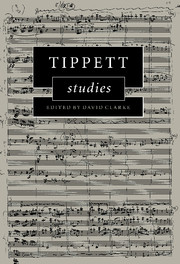Book contents
- Frontmatter
- Contents
- Preface
- References to Tippett's scores and essays
- 1 ‘Only half rebelling’: tonal strategies, folksong and ‘Englishness’ in Tippett's Concerto for Double String Orchestra
- 2 From pastiche to free composition: R. O. Morris, Tippett, and the development of pitch resources in the Fantasia Concertante on a Theme of Corelli
- 3 ‘Is there a choice at all?’ King Priam and motives for analysis
- 4 Tippett's Second Symphony, Stravinsky and the language of neoclassicism: towards a critical framework
- 5 Tippett, sequence and metaphor
- 6 Tonal elements and their significance in Tippett's Sonata No. 3 for Piano
- 7 ‘Significant gestures to the past’: formal processes and visionary moments in Tippett's Triple Concerto
- 8 Tippett's King Priam and ‘the tragic vision’
- 9 Tippett at the millennium: a personal memoir
- 10 Decline or renewal in late Tippett? The Fifth String Quartet in perspective
- Appendix: glossary of terms used in pitch-class set theory
- Index
3 - ‘Is there a choice at all?’ King Priam and motives for analysis
Published online by Cambridge University Press: 22 September 2009
- Frontmatter
- Contents
- Preface
- References to Tippett's scores and essays
- 1 ‘Only half rebelling’: tonal strategies, folksong and ‘Englishness’ in Tippett's Concerto for Double String Orchestra
- 2 From pastiche to free composition: R. O. Morris, Tippett, and the development of pitch resources in the Fantasia Concertante on a Theme of Corelli
- 3 ‘Is there a choice at all?’ King Priam and motives for analysis
- 4 Tippett's Second Symphony, Stravinsky and the language of neoclassicism: towards a critical framework
- 5 Tippett, sequence and metaphor
- 6 Tonal elements and their significance in Tippett's Sonata No. 3 for Piano
- 7 ‘Significant gestures to the past’: formal processes and visionary moments in Tippett's Triple Concerto
- 8 Tippett's King Priam and ‘the tragic vision’
- 9 Tippett at the millennium: a personal memoir
- 10 Decline or renewal in late Tippett? The Fifth String Quartet in perspective
- Appendix: glossary of terms used in pitch-class set theory
- Index
Summary
I
Tippett's article, ‘At work on King Priam’ was written in November 1960 when, as he said, ‘I am now …about to begin the music to Helen's [Act III] monologue.’ Of the opera's genesis, he writes that ‘at the very beginning there was a series of scenic titles, like eight ages of man: Birth, Boyhood, Young Love, Warriors, Women, Judgment, Mercy, Death. In each of these the characters (now one, now the other) are presented with some problem of choice and action, but in the early scenes given little knowledge. Yet the tragedy flows from one such choice, honourably made: Priam and Hecuba at the cradle of Paris.’
With these words, Tippett provided an interpretation of the opera's essential subject-matter to which he himself often returned, and which all subsequent commentators have noted and accepted, usually in conjunction with the composer's remarks on the kind of music his choice of subject led him to devise: ‘everything in King Priam is designed to enforce clarity, concision, speed, powerful declamation and even deliberate abruptness of transitions’. One of the topics I will consider in due course is the possible relation, or tension, between a tragedy that ‘flows’ from a single choice, ‘honourably made’, and music that includes lack of flow, ‘abruptness of transition’, among its most prominent features.
- Type
- Chapter
- Information
- Tippett Studies , pp. 55 - 77Publisher: Cambridge University PressPrint publication year: 1999
- 1
- Cited by



